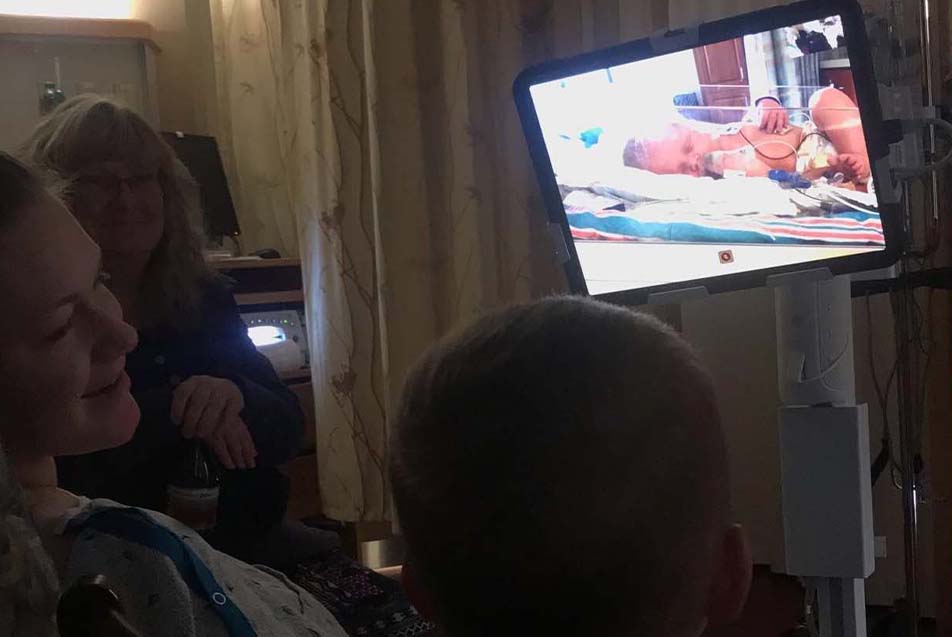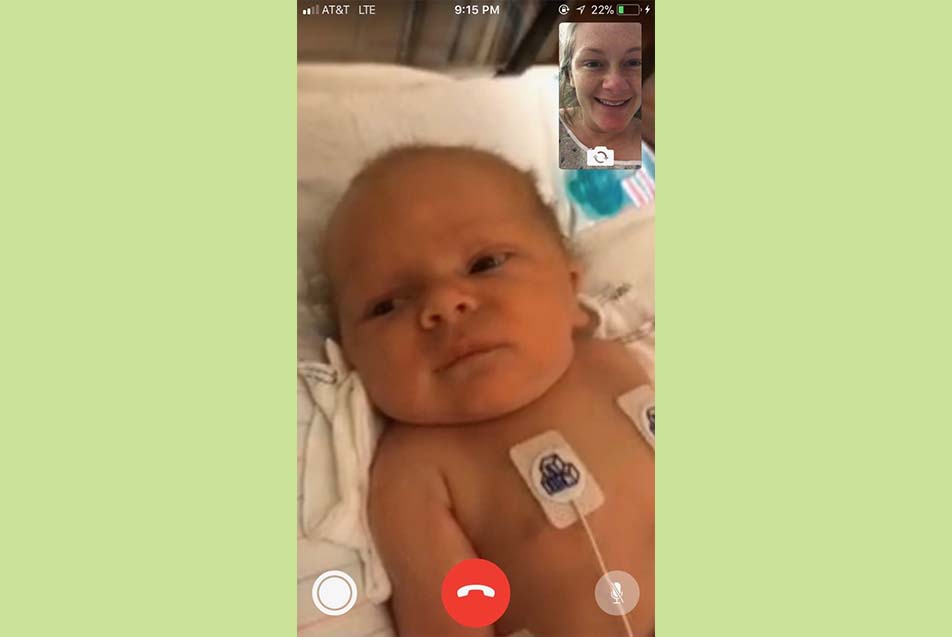Imagine. After months of waiting for your new bundle of joy, he is transported the moment he arrives to another floor or hospital that has a newborn intensive care unit (NICU). A mother being separated from her baby is never ideal, but it’s often necessary so they can both go on to live healthy and happy lives.
Often times, a baby is born at a Parkview community hospital where they cannot provide the Level III neonatal care that Parkview Regional Medical Center’s (PRMC) NICU can. When complications occur during delivery, it can lead to separation, where the baby is taken to the NICU, leaving mom to recover away from her child.
An idea
In the fall of 2018, Max Maile, vice president, Virtual Health, PRMC, attended a conference that would change how Parkview united mothers and infants in this very situation. At this conference, Max learned that another multi-system hospital was utilizing iPads through telemedicine carts to create a live-stream feed ultimately connecting a mother with her baby.

“There was a presenter talking about a similar program and as we heard about this we realized we could do that at Parkview. From a technology standpoint, we had the necessary licenses already and the video platform, we just needed the equipment,” Max said. “Our next step was contacting the foundation and within several weeks we had everything.”
Thanks to generous donors of the Parkview Foundation, Parkview was able to obtain seven telemedicine carts – one for each community hospital and the PRMC NICU.
The program, temporarily named “Baby Cam” by the staff, launched on May 1, 2019. It uses simple technology and an iPad that sits on a cart much like a television. Once requested, the Baby Cam is rolled into where the mom and baby are located. With both audio and visual capabilities, the tablets are security restricted so the parent can only dial into their infant’s specific room. Mom is then able to talk to the baby and be heard, receive an update from the nursing staff, or mute the line and just watch their new little one.
.jpg)
Connecting with Zander
In May, Madison Roach and Zach Amburgey were the first parents to utilize the Baby Cam to connect with their son, Zander. Madison had given birth at Parkview Wabash Hospital (PWB) when Zander needed to be transported to PRMC’s NICU after being stabilized. Feeling overwhelmed and defeated, the new parents were presented with the opportunity to connect with their baby. The program provided a great sense of relief and 10 hours of quality connection.

Ryan Loeffler, virtual health coordinator, explained, “That first connection between parents and baby was an honest testament to the value this equipment has. There is a sense of healing involved when a mother is at a community hospital while their baby is at PRMC’s NICU and they can observe them.
This gave our staff the reassurance they needed that this was a valuable and treasured piece of equipment.”
Ryan went on to explain that in order to ensure Parkview NICU nurses have the confidence they need to use the equipment, training is imperative. With this new technology, it’s the nurses who encourage patients and act as the liaison between connecting mom and baby.
Lisa Griswold, nursing services manager for Parkview’s NICU, explained the gratifying feeling her and her team have experienced since the arrival of the Baby Cam. “It is a great way to connect with mom and give her an update to help facilitate that mother-baby bond that they may be missing when separated. However, it goes beyond that to where parents can see whether we put baby in an outfit, when nurses do an assessment, and the little things we take for granted by being right next to them – from a first yawn to eyes opening for the first time. I feel so strongly that this is a great way to close that gap of time for when mom may be in the hospital.”
With no set time limit on the Baby Cam, mom can tune in as often and for as long as she’d like leading up to her discharge. And while babies begin developing the ability to hear sounds around 15 weeks intrauterine, the voice coming through the iPad is likely very recognizable to them, which provides a sense of comfort and familiarity.
While the equipment acts much like FaceTime, there is future optimism for other family members to remotely connect with baby and join the live-feed as well. Family members, regardless of their location, will then be able to talk, listen and connect with mom and baby.
“Without donors to the foundation, these telemedicine carts would not have been possible and that imperative, healing connection would not be made. This has spread community-wide and we are so grateful for donor generosity,” Max said. “Adding to that, it is also the NICU leaders, technology leaders, and patients that have really embraced this and implemented it – ultimately making us confident in this decision.”
To help make a difference in your community, please visit ParkviewFoundations.org to learn more.